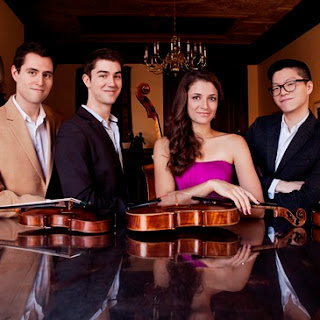Dover Quartet continues its fresh perspective on Beethoven's string quartets
It's good to follow what the Midwestern-based Dover Quartet has to say definitively as it makes its way through the Beethoven cycle for Cedille Records. A couple of months ago, "Volume 2: The Middle Quartets" was issued, and I've just gotten around to listening to the three-disc set thoroughly. The experience sustains my initial reaction to the Dover's expressive unanimity and technical élan.
Here's part of what I wrote the first time I heard the Dover Quartet in person two years ago at a concert presented by Ensemble Music Society:
"The Dover launched its appearance with an impulsive but well-knit account of Beethoven's Quartet in F minor, op. 95, dubbed Serioso after a word in the heading of its third movement. The atmosphere suggested by the word was sustained, even through the lickety-split coda of the finale. The dour feeling of the slow movement, with its downward sliding phrases, had notable sweetness from the first violin and striking plangency of viola tone. The transition to the namesake 'serioso' third movement was excellent, a foreshadowing of the connections the quartet was to forge along with the pianist in the Shostakovich [piano quintet, with Inon Barnatan ]."
The Cedille performance of that work concludes "The Middle Quartets," which are presented in chronological order. Those "downward-sliding phrases" are illustrative of the Dover's pinpoint intonation, and apply well beyond the first violin (Joel Link). Articulation is at the same high level with this ensemble, and accounts for its security in the Allegro coda of the last movement, whose main section carries the description Allegretto agitato. That direction serves as a warning, and behind the innocent-looking designation heading the coda is the requirement to play it as lightly as possible.
The Dover can be both light and agitated when need be, and the end of this quartet is as exciting as this set's predictably exuberant Allegro molto finale of Op. 59, No. 3 in C major. I don't think I've ever heard a performance of this movement so fast and so secure.
 |
| Dover Quartet makes its distinguished way through Beethoven. |
It's also worth mentioning the emotional weight given to the relatively slow movement of the same piece, Allegretto ma non troppo. The recording quality is so good that cellist Camden Shaw's defining pizzicato has a resonant "ping" to it where even good recordings render those steady plucked notes as a kind of "thump."
The movement contains a ruminative contrast introduced by the cello, which almost characterizes the quartet's deep voice as the music's counterpart to the sly philosopher Don Alfonso in Mozart's Cosi fan tutte. (While Beethoven endorsed the enlightenment values represented in that opera, the prim moralist in him disapproved of the libretto, along with that of Don Giovanni. My comparison would not have amused him.)
It's clear that the Dover believes in every moment of this music. The longest slow movement of the volume, the Molto adagio of Op. 59, no. 2, has no hint of slackening, which makes every measure of it fascinating. The group's rhythmically well-pointed finale leaves something in reserve for raising both dynamics and tempo at the Piu presto conclusion.
In the "Harp" Quartet (op. 74 in E-flat major), the Dover illuminates Beethoven's increasing confidence in treating the four instruments orchestrally from time to time. The build-up of texture and tension, with the recurring harp suggestions lending extra color as well as the work's nickname, is remarkable. Beethoven was working on the music to "Egmont" at the same time, as the booklet notes point out, and his way of suggesting drama in abstract music is evident here, as well as in the first movement of op. 59, no. 3.
The composer, somewhat blocked in his mastery of music for the stage (in part because of his ethical strictures about librettos), in his middle period comes up with abstract, instrumental music as implicitly stageworthy. The Dover is alert to such implications. Even its handling of transitional material in the C major quartet has a gestural freshness to match what seems to have been Beethoven's urge to give dramatic character to the genre.
His mounting success in doing so somewhat explains why Beethoven quartet cycles (the Dover has done three in concert) are a recurring feature of chamber-music productions today. It also lends the promise of monumentality to this ensemble's project of completeness for Cedille. I will await the late quartets with much interest.



Comments
Post a Comment